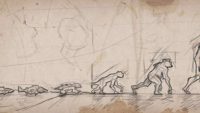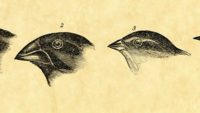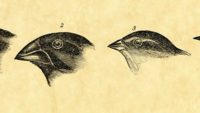By Harry F. Sanders, III Since an increase of information is needed for molecules-to-man evolution, evolutionists postulate polyploidy as a means for this. …read more Source: AIG Daily
By Dr. Danny R. Faulkner A recent news story reported on the latest measurement of Saturn’s rotation rate. This is significantly shorter than what is found in most astronomy textbooks. …read more Source: AIG Daily
By Melinda Christian Scientists have long tried to understand how geckos can walk on walls and ceilings, even on smooth glass. …read more Source: AIG Daily
By Troy Lacey Two amber fossil finds have revealed some interesting examples of similarities between fossil and extant forms, both in morphology and in lifestyle/behavior. …read more Source: AIG Daily
On January 21, 2019, during a total lunar eclipse, astronomers and amateur stargazers alike saw a small meteorite strike the lunar surface.1 The collision was seen as a flash of light just before midnight Eastern Time. The darkened surface of the moon during the eclipse made the flash much easier to see. Although scientists have observed and recorded other meteorite strikes on the lunar surface, this is apparently the first time … More… …read more Source: icr.org
By Harry F. Sanders, III Modern classification is largely dependent on a technique known as cladistics. …read more Source: AIG Daily
Think of all the jobs that our good working sense of smell fulfills. First, the nose detects a chemical—the source of the scent. It distinguishes that scent from literally billions of others. Our sense of smell even gauges the strength of the scent. Finally, the sense rapidly scans memories of past smells to interpret the odor’s level of pleasure or toxicity or something in between. Human engineers would need a large lab full of… More… …read more Source: icr.org
The junk DNA paradigm has proven to be an ill-founded icon of evolution. We’ve witnessed its pet sub-theories systematically debunked as we learn more and more about how creatures’ DNA systems work. And now one of the pet darlings of junk DNA speculation, the alleged useless nature of introns (intervening noncoding pieces of genes), has also been tossed in the evolutionary trash heap. When scientists first… More… …read more Source: icr.org
Sneak peek of latest Creation magazine.’Extreme’ living fossils shout ‘after their kind’ …read more Source: creation.com
By Dr. Jason Lisle My paper was criticizing what Guliuzza has publicly written in which he denies the reality of natural selection: a claim that he has never publicly retracted. …read more Source: AIG Daily
By Dr. Jean Lightner This brief examination of Jason Lisle’s paper highlights that misunderstanding about natural selection is more prevalent among creationists than he suggests. …read more Source: AIG Daily
Jeffrey P. Tomkins, Ph.D. and Timothy L. Clarey, Ph.D. Red algae form one of the main components of coral reefs and were originally thought to have appeared on Earth during the middle of the Cretaceous system about 100 million years ago. At least that’s what the standard evolutionary story claimed until the same type of fossils were just discovered in Silurian system roc… More… …read more Source: icr.org
There is more than one view among evolutionary researchers on how new biological structures arise. …read more Source: creation.com
By Dr. Danny R. Faulkner Flat-earthers often claim that moonlight has a cooling property. I present the results of three independent experiments that test this claim. …read more Source: AIG Daily
The recent discovery of thirty new exoplanets in other solar systems presents another challenge to the most popular secular theory of planet formation.1,2 These exoplanets are smaller versions of our gas giant Saturn. A recent survey shows that these intermediate gas giants are ten times more common than predicted by the secular theory.3 One of these intermediate gas giants, designated O… More… …read more Source: icr.org
By Dr. Danny R. Faulkner What do lunar eclipses tell us about flat earth? Lunar eclipses remain the best method for most people to see for themselves that the earth is a sphere. …read more Source: AIG Daily
Can genuine Evangelicals really come to some agreement? …read more Source: creation.com
Saturn’s gravity keeps vacuuming up its own stunning rings. NASA scientists have estimated how fast this process happens. The rings lose six Olympic-sized swimming pools-worth of material every hour according to new results from NASA’s Goddard Space Flight Center.1 For this and other reasons, scientists have concluded that the rings are unlikely to be more than 100 million years old. These rings look young, forcing sc… More… …read more Source: icr.org
by Frank Sherwin and Jeff Tomkins, Ph.D. Australian and American zoologists discovered a new species of shark.1Carcharhinus obsolerus was discovered off the coast of South East Asia but has not been found anywhere in the past eight decades. Based on the morphology of the find’s teeth and fins, researchers have concluded it’s a new species of shark, but … More… …read more Source: icr.org
Secular geologists have long claimed that oil can survive millions of years underground because it somehow becomes pasteurized at 80 oC (176 oF), preventing further biodegradation.1 These geologists argue that oil can be preserved for millions of years because the subsurface temperatures are simply too hot for microbial activity. And once the oil is pasteurized (heated enough to destroy microorganisms) and t… More… …read more Source: icr.org
By Ken Ham Researchers have announced what they believe to be the oldest flowering plant, a flower with a tree-shaped style and spoon-shaped petals from the early Jurassic, some supposed 174 million years ago. The fossils of this plant were examined with high-powered microscopes that revealed it was an angiosperm, a specific group of plants that have flowers and enclosed seeds. One researcher describes the origin of angiosperms as a long “academic headache,” and the lead author of this new paper on this fossilized flower comments, Researchers were not certain where and how flowers came into existence, because it seems [More]
By Harry F. Sanders, III The hoatzin is a very unique bird, a conglomeration of traits typical of birds, reptiles, and mammals. Its most unique features are distinctly un-birdlike. …read more Source: AIG Daily
By Heather Brinson Bruce Do fossils require millions of years to form? Hardly! Even secular geologists now recognize that rocks form very quickly. …read more Source: AIG Daily
By Harry F. Sanders, III The tripod fish, which is challenging to evolutionists, is a truly unique creature that exhibits remarkable evidence of God’s hand in his creation. …read more Source: AIG Daily
Secular science believes Earth’s oceans have existed for about four billion years.1 They also think the level of the ocean has remained about the same over that vast period of time. However, a new study published in Nature creates serious problems for the uniformitarian origin of our oceans and their long-term sustainability.2 Chen Cai and his colleagues from Washington University … More… …read more Source: icr.org
The sea creature that makes so much of an impression, its effects can be seen from outer space. …read more Source: creation.com
In the opening sentence in an article titled “Scientific Regress”, the author William Wilson remarks: “Scientific claims rest on the idea that experiments repeated under nearly identical conditions ought to yield approximately the same results, but until very recently, very few had bothered to check in a systematic way whether this was actually the case.”1 The article is about science and the repeatability of scientific results published in the peer-reviewed scientific literature. (Indented paragraphs are quoted from this article, unless otherwise referenced.) Claims not replicated Read More: Science and fraud – creation.com












































